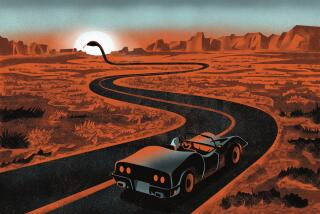The Reading Life: Thinking about ‘Double Indemnity’
- Share via
Thanks to the miracle of DVR, my wife Rae and I spent the other night watching “Double Indemnity,” a film we hadn’t seen in years. Directed by Billy Wilder, with a script by Wilder and Raymond Chandler and based on a novel by James M. Cain, it is a movie with an almost perfect noir pedigree.
More than this, though, it is a classic story, one that speaks to both its moment (the book was written in the 1930s) and to ours. As Joan Didion writes in her essay “Some Dreamers of the Golden Dream”: “This is the country in which a belief in the literal interpretation of Genesis has slipped imperceptibly into a belief in the literal interpretation of ‘Double Indemnity.’”
That’s a great line, vintage Didion, and it highlights what she does so often in her writing: to stretch the particular until it seems universal, as well. In “Some Dreamers,” that particularity appears to be drawn directly from Cain’s taut little immorality play; a woman, Lucille Miller, is convicted of killing her husband, and may or may not have also killed her lover’s wife. It’s tawdry, clichéd almost, ripped from the scandal sheets. But this is Didion’s point all along.
“It was in the breakup,” she writes, “that the affair ceased to be in the conventional mode and began to resemble instead the novels of James M. Cain, the movies of the late 1930’s, all the dreams in which violence and threats and blackmail are made to seem commonplaces of middle-class life.” The dream, in other words, “was teaching the dreamers how to live.”
And yet, for all the acuity of that observation, Didion blurs another boundary here, between the movie and the book. “Double Indemnity” may be a terrific film, but it is also one of the great American novels of the 1930s, a story not just about middle-class dissatisfaction, but even more, about a nihilism so deep it borders on the existential, until it overwhelms everything.
“Walter, the time has come,” Phyllis, the femme fatale, says in the novel’s final pages, “… [f]or me to meet my bridegroom. The only one I ever loved. One night I’ll drop off the stern of the ship. Then, little by little I’ll feel his icy fingers creeping into my heart.”
She’s talking about death, of course, which is what makes “Double Indemnity” so disturbing; such a vision was too bleak for Hollywood. “Maybe I’m crazy,” Phyllis admits. “But there’s something in me that loves Death. I think of myself as Death sometimes. In a scarlet shroud, floating through the night. I’m so beautiful, then. And sad. And hungry to make the whole world happy, by taking them out where I am, into the night, away from all trouble, all unhappiness …”
More to Read
Sign up for our Book Club newsletter
Get the latest news, events and more from the Los Angeles Times Book Club, and help us get L.A. reading and talking.
You may occasionally receive promotional content from the Los Angeles Times.







